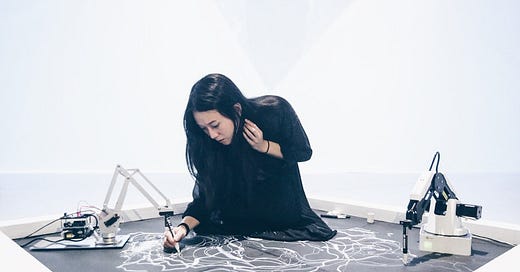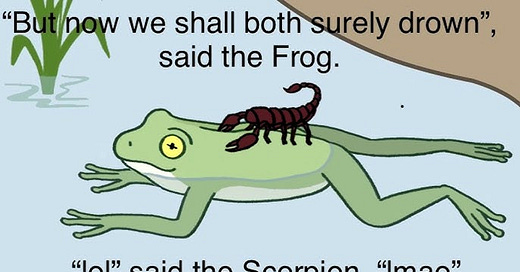

Discover more from thot pudding
what's earned, what's not
on AI, beauty, threat, and the tech-capitalist losers we handed the reins to
“I’m very skeptical of books. I don’t want to say no book is ever worth reading, but I actually do believe something pretty close to that. I think, if you wrote a book, you fucked up, and it should have been a six-paragraph blog post.” - Sam Bankman-Fried
The First Law: A robot may not injure a human being or, through inaction, allow a human being to come to harm. The Second Law: A robot must obey the orders given it by human beings except where such orders would conflict with the First Law. - Isaac Asimov
one
In the last week, assuming you follow authors on social media, you’ve seen repeated variations on a screenshot. A writer searches for their book on a gray-screened database, finds a match. The match is bad news. Proof of a strange, irremediable theft.
Thanks to Alex Reisner’s reporting at The Atlantic, we’ve learned that multiple AI large language models (LLMs), including Meta’s LLaMA, have secretively been trained using Books3, a dataset of about 183,000 pirated books. So, without consent from or compensation accrued to the writers of those books. The response from most authors has been to clock it as the existential threat and violation it is, with some logic-light contrarian clowning peppered in. All around us, it appears, the waters are rising. A literary prize in Japan longlisted a novella generated by an AI LLM a couple of years ago. Amazon is already awash in AI-generated titles, some of which fraudulently use actual authors’ names. The quality of these AI-generated books is pure shit. But soon, especially with the new LLMs, trained off of thousands of stolen works, it might not be.
A couple of months ago, a writer I admire told me in an Idaho airport that when it comes to getting paid for writing books/making art/writing scripts, he thinks we have about eight years left.
two
This is all of course a worse variant of the joke management plays on workers sometimes. You’re let go, fired, axed, canned, but before you go, you’re asked to train your replacement. Even funnier, you realize you’ve been training them for months, and didn’t know.
To be clear, the LLMs aren’t being trained with the express goal of replacing writers exclusively—there are a far wider variety of efficiencies to be identified, baby. Secretaries, actors, logistics associates, therapists, middle managers, musicians, bank tellers, novelists, illustrators, cashiers. There are just so many, many jobs that someone—at the highest levels of an org chart, in private equity, around a McKinsey strategy room—will soon be able to identify as the gap between the present and a higher profit margin.
Maybe someone somewhere will see it as funny that the pale sons of Silicon Valley who’d see it an arrant waste of time to read Tolstoy or Zola, will leverage their work and that of countless other writers to sever masses of people from their livelihoods. Ha ha ha! Ha ha ha!
three
The weekend before last, in between dancing to a Marie Montexier set at Public Records, I had a long conversation with Phil and E, a charming new friend. The two of them talked about the things they miss about the Internet of the past, about style, about that ineffable thing we call taste. We discussed our continued desire to discover things that matter to us—music, food, art, books—from exploration in the world or an actual human’s curatorial choices, not an algorithm’s mechanized pattern-finding à la Netflix or Spotify. At some point, I cited (I thought) something musician Kazu Makino said in an interview, that “taste and style are an earned individuality.”
The most important word in that sentence for me, I said, the word more and more lacking in our leaden contemporary life for me, was earned.
To earn comes from Old English earnian "deserve, earn, merit, labor for, win, get a reward for labor," from Proto-Germanic aznon "do harvest work, serve, reap" When I feel unease at the milieu around me, I’m given pause by the one million app-mediated interactions meant to outsource units of menial labor to interchangeable low-wage laborers, the proliferation of a San Francisco aesthetic in new bars and cafes, the writer whose parents bought him a whole-ass house so he could finish his first book without worrying about rent, how so many creative people present exactly alike in their pursuit of style, how turnkey so much seems in contemporary life, how aggressively ugly, how microwaved.
Profit-driven digital life, life under automation and financialization and algorithms and the attention economy, is part of what brought us here, to this grayed-out, insipid, loneliness-saturated time, where everything is buy now with 1-Click, and so comparatively little gives joy, or meaning, or beauty.
four
Reading through the posts of people who’d found their books stolen by LLaMA et al, I noticed again and again, a grief-tinged citing of the time it took to write their works. Eight, ten, three, twenty years, to write, to live, to heal, to make pages through evenings or the asscrack of dawn, to weather the emotional dust-devils that come with gestating the work and bending it to your will. Not to mention, the experiential knowledge you need to accumulate to inform the writing itself, which is, no way around it, the fruit of decades.
Pattern-finding algorithms, large-language models, raw computational power, cannot actually replicate this. But they can be trained on human-generated work until they, for a finite period of time, come up with good-enough facsimiles.
What is the opposite of earn? To lose, to pay, to be forced, to be given, to steal, to forfeit.
five
(A digression: when I tried to look up the line thought I remembered at Public Records I found it exactly nowhere. Did I make it up wholesale, I wondered. There was in fact a Kazu Makino interview where she’d been asked about style, I’d gotten that part right.
The ability to identify yourself outside of you. I do love that. You could argue that’s also what we get from art. The ability to identify yourself outside of you; crucial to style, to relational connection, to writing, to organizing, to doing politics at all.)
The political act we as writers have been recommended in the face of all this is to join the Author’s Guild (I have), and send letters to the CEOs of AI companies. The Authors Guild and their lawyers have arrived at a series of demands for AI companies, to be enshrined, hopefully, in laws and a regulatory framework.
This is so laughably, terribly bleak to me. Like, I hope it all happens, sure, it’s certainly better than the current nothing, if that’s our bar. Is that our bar? Subterranean, lower than the ground itself? There’s that Sun Tzu line, “Victorious warriors win first and then go to war, while defeated warriors go to war first and then seek to win.”
This is an imaginative handbook of defeat, from people who have not appeared to grasp what the stakes in winning or losing might even be.
We could renew and massify the call to arms to pause AI, for one. The PauseAI coalition cites, among other concerns, the meaningful potential of eventual superintelligent AI to destroy human life. Six months ago, people including known Luddites Steve Wozniak and Elon Musk signed on to a letter and proposal urging this pause…which has among its calls to action a ban on using copyrighted material, so as to slow down the possibility of training superintelligent AI.
Pausing, or even slowing, would be complex, but accrue immense collective benefits, and anyway, no non-complex options are currently on offer to us.
Is the best possible scenario in the eyes of our culture’s writers and luminaries and their legal counsel one where Margaret Atwood and Haruki Murakami and whichever other big-dog-writer, can consent to, and be compensated for, their work being used to train the technology of arch-capitalists which has the potential to put future writers out of work, usher in mass unemployment, or herald eventual extinction? Ha ha ha! Ha ha ha!
six
In one of my favorite recent essays on AI, Kyle Chayka’s Rethinking The Luddites In The Age of A.I, Chayka takes us to 1811 Nottingham, where twenty thousand garment and textile workers had been put out of work because of the introduction of knitting machines like lace frames. Indignant and desperate, the “beleaguered workers had begun breaking into factories to smash the machines,” Chayka notes, adding, “Today, the word “Luddite” is used as an insult to anyone resistant to technological innovation; it suggests ignoramuses, sticks in the mud, obstacles to progress. But a new book…titled “Blood in the Machine,” argues that Luddism stood not against technology per se but for the rights of workers above the inequitable profitability of machines.”
So yeah, there’s hope, however choked and slender. The triumph of Hollywood writers against the encroachment of AI is a galvanizing model for many workers. There appears to be an appetite within the Biden administration to go after tech giants and monopolistic corporations, which indicates to me an openness to be responsive to mass worker concerns about AI. But in order for that to happen, workers, artists, writers, policymakers, the pundit class, all need to make some fucking noise.
Here’s a final joke in an essay full of them: all generative AI models need to train on human-produced data to continue to function. When trained on content generated by other models, the outputs exhibit irreversible failings. Their outputs become garbled, error-ridden, uncanny, homogenous. You could say, inbred. Even in the best learning conditions, model collapse has been found to be inevitable every time.
It has been two hundred and sixty plus years since the Industrial Revolution and robots are not capable of sewing so much as a t-shirt. Pay for garment workers is terrible, of course, the quality of fabrics is increasingly ghastly petro-plastic, mechanization and automation exists throughout the sector, especially in fast fashion. But every piece of clothing you’ve ever worn, high end or Shein, was made by human hands.
Human labor can never go away. It can only erode, in dignity, in compensation, in protection, in beauty, in meaning.
seven
Donna Haraway once said the relationship between organism and machine has been a border war. I subscribe to that, and the essential argument that we are all already some degree of cyborgs, dependent on technologies to function, to extend our capacities in a thousand ways. I am not sorry for the dishwasher or the word processor or even, most days, my stupid phone. But I also want to know some things.
I want to know when and why exactly, in the thirteen years since Mark Zuckerberg’s mug was first splashed all over TIME magazine, we have insisted on continuing to hand the reins to profit junkies and tech capitalists and some of the most grandstanding clever-stupid people on earth. People who came to rule the world through a mixture of the sheer affordances of technology and capital, sure, but also through possessing the sociopathic opportunism and presentism of your average toddler.
I want to know why, in the age of climate change, Microsoft’s AI supercomputers are guzzling tens of millions of gallons of water in places like drought-stricken Iowa, where they are consistently the top three consumers of water, prompting one Des Moines resident to remark “they’re giving all the good water to ChatGPT.”
I want to know the net positives brought to the world in the past fifteen years by the majority of the tech “disruptors” who benefited from, above all else, slow to nonexistent regulation. Put otherwise, I want to know why we—media, policymakers, legislators, working people—continue to more or less be meekly led by variants of Midas 2.0, who eventually turns what he touches to piss.
I want to know why in an ostensible democracy we are incapable of having a conversation about the ways in which technology might move to service our collective desires, as opposed to those of the hunting dogs of the financier class.
But I have to stop for now.
Until next,
STM
p.s. events you should come to (brooklyn, manhattan, philly)
Tonight 10/2 in Brooklyn, I’m in conversation with C Pam Zhang for her sexy and lauded sophomore novel Land of Milk and Honey. Friday 10/13 in Philadelphia, I’ll be reading from ATCBD at American Grammar. PEN America has me moderating a conversation with Ayad Akhtar and A.M. Holmes on capital P-Politics in fiction on 10/16. I’ll be discussing immigrant writing and finding home with Jonathan Escoffery and Angie Cruz on 10/18. Come hang out at any of these; I’d love to see you.
Finally, I’m teaching two creative writing workshops through Kundiman, $50 each. Nov 4th is Creating Intimacy, which focuses on writing sex and intimacy, broadly construed. Nov 18 is Writing Parents, which explores the art and ethics of depicting parental figures in your work.
p.p.s. stating the obv
If you write something influenced by this newsletter, I expect you’ll cite it. And a more macro reminder: I’m a working artist. I’m not confident I’ll get to be one in the long haul; the future’s unknowable, a veritable card-castle of precarities. For now I’m grateful for every copy of my book that someone buys, every class someone pays to take with me, every pledge to this newsletter that gets me closer to flipping the switch of generating modest income from it, every share of my work online, every library hold, every kind note. You help make it possible for me to continue to write.




















“But every piece of clothing you’ve ever worn, high end or Shein, was made by human hands. Human labor can never go away. It can only erode, in dignity, in compensation, in protection, in beauty, in meaning.” I can’t stop thinking about this. This is so beautifully phrased, and so true.
thank you for laying it out so clearly. i feel like a lot of people understand ai as an existential threat on a certain level, but then, i live in san francisco, and i see all the time how people get too close to ai that they don't see the same danger. "chatgpt is worth playing with!" "ai art saves time on editing photos!" "riding in driverless cars is cool!" it's trippy and so bleak - so thank you for writing this because it gives me something to send to those clowns <3